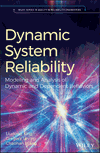Functional Dependence
Summary
Functional dependence takes place when the malfunction of one system component causes other components within the same system to become unusable or inaccessible. The functional dependence behavior is modeled via Functional DEPendence (FDEP) gates in the dynamic fault tree (FT) analysis. This chapter discusses a logic OR replacement method for the reliability analysis of systems with FDEP and perfect fault coverage. It presents a combinatorial approach for reliability analysis of systems subject to imperfect fault coverage. The combinatorial algorithm can handle various complicated cases including cascading FDEPs, combined trigger events, shared dependent events, and dual-role events. The algorithm, which practices the divide and conquer principle based on the total probability law, is computationally efficient. The reduced reliability problems generated are simplified and independent problems without FDEP, which can be solved in parallel given available computing resources using any traditional FT analysis method.



